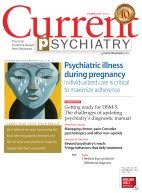 Henry A. Nasrallah, MD
Henry A. Nasrallah, MDEditor-in-Chief
Few things capture the imagination like the future. I recall how after reading Alvin Toffler’s seminal book Future Shock in college, I was fascinated by how the future could change us as people and as a culture.
During medical school and psychiatric residency, the breathless pace of scientific discoveries—especially in neuroscience—prompted me to dream about the potentially stunning medical breakthroughs of the future. My frustrations about severe, disabling psychiatric brain disorders were tempered by hope that tomorrow will unfold new knowledge that will unravel the dark mysteries of psychotic delusions, obsessive-compulsive disorder (OCD) rituals, intractable narcissism, suicidal urges, and homicidal impulses. The future, I frequently mused, will provide all answers for definitive diagnoses, effective treatments, prevention, and cures for all psychiatric disorders.
Hope for restoring wellness for our suffering patients continues to sustain me and my fellow psychiatrists. The ongoing gush of neuroscience advances that elucidate the divine details of brain and mind continue to inspire us. However, we are getting impatient with the slow translation of groundbreaking basic science discoveries into new and dramatic clinical applications for our long-suffering patients. A collective mantra is building up: We want our future and we want it now!
Evolving advances are lurking in our future, some of which already are palpable and we hope may soon become clinical realities liberties.


No comments:
Post a Comment